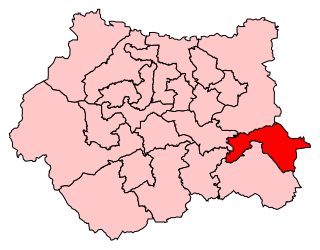
Castleford is a town within the City of Wakefield district, West Yorkshire, England. It had a population of 45,106 at a 2021 population estimate. Historically in the West Riding of Yorkshire, to the north of the town centre the River Calder joins the River Aire and the Aire and Calder Navigation. It is located north east of Wakefield, north of Pontefract and south east of Leeds. Castleford is the largest town in the Wakefield district after Wakefield itself.

Pontefract is a historic market town in the Metropolitan Borough of Wakefield in West Yorkshire, England, east of Wakefield and south of Castleford. Historically part of the West Riding of Yorkshire, it is one of the towns in the City of Wakefield district and had a population of 30,881 at the 2011 Census. Pontefract's motto is Post mortem patris pro filio, Latin for "After the death of the father, support the son", a reference to the town's Royalist sympathies in the English Civil War. Small villages and settlements in the immediate area include Stapleton.

Richard Monckton Milnes, 1st Baron Houghton, FRS was an English poet, patron of literature and a politician who strongly supported social justice.

Robert Offley Ashburton Crewe-Milnes, 1st Marquess of Crewe,, known as The Honourable Robert Milnes from 1863 to 1885, The Lord Houghton from 1885 to 1895 and as The Earl of Crewe from 1895 to 1911, was a British Liberal politician, statesman and writer.

Marquess of Crewe was a title in the Peerage of the United Kingdom. It was created in 1911 for the Liberal statesman Robert Crewe-Milnes, 1st Earl of Crewe. He had already been created Earl of Crewe, of Crewe, Cheshire, in 1895, and was made Earl of Madeley, in Staffordshire, at the same time as he was granted the marquessate. These titles were also in the Peerage of the United Kingdom. Lord Crewe was the only son of the noted Victorian literary personage Richard Monckton Milnes. The latter had been raised to the Peerage of the United Kingdom as Baron Houghton, of Great Houghton in the West Riding of Yorkshire, in 1863. Lord Houghton married the Honourable Annabella Crewe, daughter of John Crewe, 2nd Baron Crewe. Their son, the second Baron, succeeded to the Crewe estates on the death of his maternal uncle Hungerford Crewe, 3rd Baron Crewe, in 1894. Lord Crewe's two sons both predeceased him and the titles became extinct on his death in 1945.

PontefractCastle is a castle ruin in the town of Pontefract, in West Yorkshire, England. King Richard II is thought to have died there. It was the site of a series of famous sieges during the 17th-century English Civil War.

Wakefield, commonly known as the City of Wakefield, is a local government district with the status of a city and metropolitan borough in West Yorkshire, England. Wakefield, the largest settlement, is the administrative centre of the district. The population of the City of Wakefield at the 2011 Census was 325,837.

Methley is a dispersed village in the City of Leeds metropolitan borough, south east of Leeds, West Yorkshire, England. It is located near Rothwell, Oulton, Woodlesford, Mickletown and Allerton Bywater. The Leeds City Ward is called Kippax and Methley. It is within the triangle formed by Leeds, Castleford and Wakefield, and between the confluence of the River Aire and River Calder. The latter is crossed by Methley Bridge, the A639 road, about a mile south-east of the village.

Normanton, Pontefract and Castleford is a constituency in West Yorkshire represented in the House of Commons of the UK Parliament by Yvette Cooper of the Labour Party since its 2010 creation. Cooper has served under the governments of Tony Blair and Gordon Brown alongside her husband Ed Balls, and served as Shadow Home Secretary under the leadership of Ed Miliband. Having served as chair of the Home Affairs Select Committee, she is once again the Shadow Home Secretary.
Pontefract was an English parliamentary constituency centred on the town of Pontefract in the West Riding of Yorkshire, which returned two Members of Parliament to the House of Commons briefly in the 13th century and again from 1621 until 1885, and one member from 1885 to 1974.

Ferry Fryston is a suburb of the town of Castleford in West Yorkshire, England. It is situated in the metropolitan borough of the City of Wakefield. The appropriate ward is called Airedale and Ferry Fryston.

New Fryston is a small former coal mining village in Castleford, West Yorkshire, England, located in a river bend on the south bank of the River Aire.

The Municipal Borough of Castleford was a local government district in the West Riding of Yorkshire from 1955 to 1974 around the town of Castleford, covering Airedale, New Fryston, Whitwood, Cutsyke, Glasshoughton and Whitwood. The Castleford Urban District administered the town from 1894 to 1955.
Robert Pemberton Milnes, was a British landowner and politician.
George Crowle, of Springhead, near Hull, Yorkshire was a British Whig politician who sat in the House of Commons from 1724 to 1747.
Richard Crowle was a Yorkshire lawyer and a Member of Parliament for the Kingston upon Hull parliamentary constituency.

Daniel Wilson of Dallam Tower, Westmorland was a British Whig politician who sat in the House of Commons for a total of 34 years between 1708 and 1747.

Robert Monckton-Arundell, 4th Viscount Galway, PC KB was an English peer and politician.

Richard Slater Milnes was an English heir, landowner and politician. The heir to a cloth fortune, he served in the British Parliament, where he championed the abolitionist cause.
Paul P. Coventry is an English former professional rugby league footballer who played in the 1970s and 1980s. He played at club level for Fryston A.R.L.F.C., the Featherstone Rovers, and Wakefield Trinity, as a wing, centre, or stand-off, i.e. number 2 or 5, 3 or 4, or 6, he was previously the chairman of the Featherstone Rovers, and as of 2013 is the stadium co-ordinator at Post Office Road, Featherstone.
















